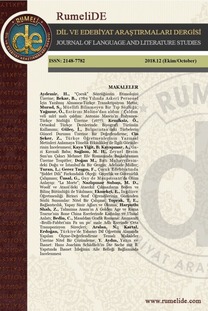Üniversite öğrencilerinin bireysel tercihleri ve Türkiye’ de çeviri eğitimi
Çeviribilim bölümü öğrencileri, edebi ve teknik metinlerin bir dilden başka bir dile yazılı ve sözlü çevirisinin teori ve pratiği ile ilgili yoğun bir eğitim alırlar. Ayrıca çok dilli kültürel arabuluculuğun içeriği ve stratejileri hakkında bilgi sahibi olurlar. Çeviribilim bölümü, öğrencilere çeşitli dillerdeki genel ve teknik metinlerle başa çıkmak için ihtiyaç duyacakları bilgileri sağlamayı amaçlamaktadır. Öğrenciler çeviri pratiğinin yöntem ve tekniklerini öğrenirler, disiplinin bilimsel yönünü, kuramlarını tanırlar ve teknolojiyle paralel olarak gelişen çeviri araçlarını nasıl kullanacaklarına dair bilgi edinirler. Çeviribilim bölümlerinde öğrencileri geleceğe yönelik çok farklı mesleki alanlarda çalışmalarını sağlayacak disiplinlerarası çalışmalar beklemektedir. Türk üniversitelerindeki Çeviribilim/Mütercim Tercümanlık bölümleri, öğrencilere amaçlanan çeviri ve çeviri alt edinçlerin kazanılmasının ötesinde, çalışmalarını kişiselleştirmeleri için çok çeşitli fırsatlar sunmaktadır. Özellikle dil ve çeviri ile ilgili kültürlerarası beceriler geliştirilir. Bu çalışmada Almanca Mütercim Tercümanlık bölümü öğrencilerinin bireysel tercihleri, Türkiye'deki çeviri eğitimi ve çeviri edinci ele alınmaktadır. Çalışmanın uygulama bölümü için öğrencilerin bölüme bilinçli mi yoksa başka motivasyonlarla mı geldikleri sorusu önem arz etmektedir. Bu bilimsel çalışma için Edirne’de bulunan Trakya Üniversitesi öğrencilerine şu sorular sorulmuştur: Neden yabancı dil okumaya karar verdiniz? Neden Mütercim Tercümanlık okumaya karar verdiniz? Mütercim Tercümanlık bölümü yerine neden Alman Dili ve Edebiyatı veya Almanca Öğretmenliği bölümlerini tercih etmediniz? Bu sorulara verilen cevaplar çalışmada değerlendirilerek yorumlanmıştır.
Anahtar Kelimeler:
Çeviribilim, çeviri eğitimi, çeviri edinci, alt edinçler, yabancı dil eğitimi
The individual preferences of the students and Translation didactics in Turkey
Translation Studies students receive intensive training in the theory and practice of the written and oral translation of literary and technical texts from one language to another. They also learn about the content and strategies of multilingual cultural mediation. The Department of Translation Studies aims to provide students with the knowledge they will need to deal with general and technical texts in various languages. Students learn the methods and techniques of translation practice, get acquainted with the scientific aspect and theories of the discipline, and learn how to use translation tools that develop in parallel with technology. Interdisciplinary studies that will enable students to work in many different professional fields for the future are waiting for students in translation studies departments. Translation Studies/Translation and Interpretation departments at Turkish universities offer students a wide range of opportunities to personalize their studies beyond the acquisition of the intended translation and translation competence. Intercultural skills, especially related to language and translation, are developed. In this study, the individual preferences of the students of the Department of German Translation and Interpretation, translation education in Turkey and translation competence are discussed. For the application part of the study, the question of whether the students come to the department consciously or with other motivations is important. Trakya University students in Edirne were asked the following questions for this scientific study: Why did you decide to study a foreign language? Why did you decide to study Translation and Interpretation? Why didn't you choose German Language and Literature or German Teaching departments instead of Translation and Interpretation department? The answers to these questions were evaluated and interpreted in the study.
Keywords:
Translation studies, translation didactics, translation competence, partial competence, foreign language studies,
___
- Ammann, M. (2008). Grundlagen der modernen translationstheorie- ein leitfaden für studierende. Akademik çeviri eğitimine giriş. çev. Ekeman, E. Deniz, İstanbul, Multilingual.
- Barczaitis, R. (2002). Kompetenz der übersetzerischen textproduktion, Best, Joanna/ Kalina, Sylvia (Hg.) Übersetzen und Dolmetschen: Eine Orientierungshilfe. Tübingen und Basel, 174- 183.
- Budin, G. (2002). Wissensmanagement in der translation, Best, Joanna/ Kalina, Sylivia (Hg.) Übersetzen und Dolmetschen: eine Orientierungshilfe. Tübüngen und Basel, 74- 84.
- Eruz, S. (2008). Akademik çeviri eğitimi çeviri amaçlı metin çözümlemesi, İstanbul, Multilingual.
- Hansen, G. (1998). Die rolle der fremdsprachigen kompetenz, Snell-Hornby,Mary /Hönig, Hans G. /Kussmaul, Paul /Schmitt Peter A.(Hg.). Handbuch Translation. Tübingen, 341- 343.
- Hönig, H. G. (1991). Strategie der übersetzung, Tübingen.
- Neubert, A. (2000). Competence in language, in languages, and in translation, Schäffner, Christina (Hrsg.). Developing Translation Competence. Amsterdam, 3- 18.
- Nord, C. (1992). Text analysis in aranslator training, Dollerup, Cay/ Loddegaard, Anne (Hrsg.). Teaching Translation und Interpreting: Trainig, Talent and Experience. Amsterdam, 39- 48.
- Nord, C. (2002). Fertigkeit übersetzen: Ein selbstlernkurs zum übersetzenlernen und übersetzenlehren, San Vicente, Editorial Club Universitario.
- Reiss, K. und Vermeer, H. J. (1991): Grundlegung einer allgemeinen translationstheorie. 2. Auflage. Tübingen.
- Risku, H. (1998). Translatorische kompetenz: Kognitive grundlagen des übersetzens als expertentätigkeit. Stauffenburg.
- Vermeer, H. J. (1986). Übersetzen als kultureller Transfer, Snell- Hornby, Marry. (Hg.) Übersetzungswissenschaft – eine Neuorientierung. Zur Integration von Theorie und Praxis, Tübingen, 30- 53.
- Witte, H. (2007). Die kulturkompetenz des translators. Tübingen.
- ISSN: 2148-7782
- Yayın Aralığı: Yılda 6 Sayı
- Başlangıç: 2014
- Yayıncı: Yakup YILMAZ
Sayıdaki Diğer Makaleler
32-Türkan Şoray’ın ikinci dalga kadın hareketi paralelinde değişen kariyeri
47-Çağ romanı (Zeitroman) kavramına dair genel bir değerlendirme
73-Sosyolojik eksende kültürel diplomasi ve çeviri
Fahriye ÇAKIR, Nesrin TEKİN ÇETİN
55-Kur’ân’da geçen lider kavramları ve özellikleri
Mehmet DOĞAN, Nazlı KOÇ, Mehmet SARAÇ
Mehmet FİDAN, Erdem SARIASLAN, Ahmet YILMAZ
